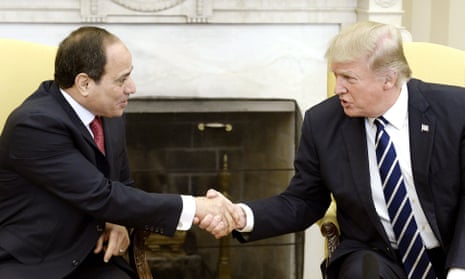The news that Egypt’s army shot dead up to eight unarmed detainees, including a minor, in the Sinai peninsula and tried to cover up the extrajudicial killings by claiming they had happened in combat should alarm all those interested in the cause of democracy in the Arab world. Back in December the Egyptian army posted on its Facebook page that the military had raided a militant outpost, killing eight and arresting four others. But a three-minute video that emerged this weekend raises serious questions over the army’s version of events. It shows no firefight but does record the cold-blooded murder of prisoners. In one instance a soldier casually shoots a man in the head. In another, soldiers escort a blindfolded man into a field, place him on his knees and shoot him repeatedly. Predictably, Cairo’s military dictatorship calls this propaganda by its opponents. Just as predictable is that there’s to be no investigation into alleged war crimes.
The video was leaked on the day the US defence secretary, Jim Mattis, sat down with Egypt’s ruler, Abdel Fatah al-Sisi, who seized power in a bloody coup in 2013. Possibly the most authoritarian leader in the Middle East, a title for which there is some competition, Mr Sisi bears responsibility for the deaths of hundreds of Egyptians, jailing thousands of others and running his country’s economy into the ground.
Instead of treating the Egyptian leader as a pariah, this month Donald Trump welcomed him to the White House after he had been cold-shouldered by Barack Obama for years. Cairo’s pro-Sisi press proclaimed human rights in Egypt were no longer an issue. This may be true. While Egypt remains a human rights “priority country” for Britain, the foreign secretary, Boris Johnson, did not focus on them when he visited the country in February. Perhaps Britain cannot afford such moral positions. British companies have extensive offshore gas interests in Egypt. The hypocrisy is not just ours. Following the coup, an EU arms embargo was brought in but it is honoured more in the breach. About £120m in British arms have been sold since the coup.
Every state must deal with unsavoury leaders to pursue a national interest, but enabling a regime to torture and kill civilians and political opponents is a dreadful wrong. That is why Human Rights Watch is right to this week call on parliamentarians in Berlin to reject a proposed security agreement with Cairo because it could make German officials complicit in serious human rights violations.
Egypt matters not just for its size but also as a weathervane of the political forces shaping the Arab world. Human rights abuses undermine efforts to establish security throughout Egypt. If Mr Sisi wanted advice he should heed his own. As defence minister under President Mohamed Morsi, Egypt’s first democratically elected head of state, he lectured army officers about the need to tread carefully in sands of the Sinai. He warned troops they risked creating an enemy within if they were to besiege and bomb civilians. Security, he said, could not be imposed by combat. Mr Sisi cautioned that a South Sudan situation could develop where a low-level revolt became an armed independence movement. That is now a real danger. Experts point out there is a terror attack every day in Sinai. It was here the Egyptian army fought three wars against Israel. Mr Sisi has turned what started five years ago as minor local unrest into an Egypt-wide jihadi insurgency.
